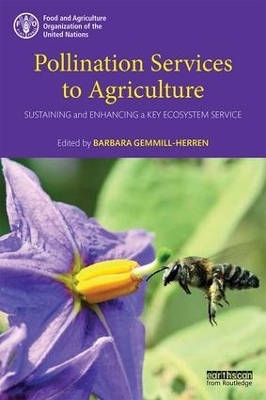
Pollination Services to Agriculture
Routledge (Verlag)
978-1-138-90440-8 (ISBN)
It reviews the expanding knowledge base on pollination services, providing evidence to document the status, trends and importance of pollinators to sustainable agricultural production. It provides practical and specific measures that land managers can undertake to ensure that agroecosystems are supportive and friendly to pollinators. It draws on the Global Pollination Project, supported by UNEP/GEF and implemented by FAO and seven partner countries (Brazil, Ghana, India, Kenya, Nepal, Pakistan and South Africa), which serve to provide "lessons from the field".
Barbara Gemmill-Herren was the Focal Point of the International Pollinator Initiative and Global Pollination Project Coordinator at the Food and Agriculture Organization (FAO) of the United Nations, Rome, Italy, until she retired in 2015.
Part 1: Building the Knowledge Base on Pollination 1. Monitoring Pollinators around the World Gretchen LeBuhn, Edward F. Connor, Marietta Brand, Jonathan F. Colville, Kedar Devkota, Resham Bahadur Thapa, Muo Kasina, Ravindra K Joshi, Kwame Aidoo, Peter Kwapong, Charles Annoh, Paul Bosu and Muhammad Khalid Rafique 2. Identifying and Assessing Pollination Deficits in Crops Breno M. Freitas, Bernard E. Vaissière, Antonio Saraiva, Luísa G. Carvalheiro, Lucas A. Garibaldi and Hien Ngo 3. Incremental Contribution of Pollination and other Ecosystem Services to Agricultural Productivity: Effects of Service Quantity and Quality Lucas A. Garibaldi, Marcelo A. Aizen, Saul A. Cunningham, Lawrence D. Harder and Alexandra M. Klein 4. Adaptation of an Economy Facing Pollinator Decline: A Prospective Analysis from the French Case Nicola Gallai and Jean-Michel Salles 5. The Identification of Pollinators: Where are We and Where Should We Go? Laurence Packer, Erica Ali, Sheila Dumesh and Ken Walker 6. Establishing Knowledge Management Systems for Ecological Interactions: The Case of Crop Pollinators Luísa Gigante Carvalheiro, Antonio Mauro Saraiva and Tereza Cristina Giannini 7. Indigenous Knowledge, Local Communities and Pollination Phrang Roy, Vanda Altarelli, Giulia Maria Baldinelli, Riccardo Bononi, Bryan Edmundo Rado Janzic and Ana Julia Vicente Taylor Part 2: Adaptive Management of Pollination Services 8. Farm-tailored Measures to Sustain and Enhance Pollination Services Rufus Isaacs, Brett Blaauw, Neal Williams, Peter Kwapong, Eric Lee-Mäder and Mace Vaughan 9. Developing Pollination Management Plans across Agricultural Landscapes: Quo Vadis, Sustainable Crop Pollination? David Ward Roubik and Barbara Gemmill-Herren Part 3: Mainstreaming Pollination Services 10. The Impacts of Agrochemical Pesticides on Bees in Intensively Cultivated Farmland James Cresswell 11. Bumblebee Conservation Worldwide within the IUCN Framework Edward Spevak, Sarina Jepson and Paul Williams 12. Global Public Awareness of Pollination and Pollinators: Recent Trends and Dynamics Dino J. Martins, Mace Vaughan and Scott Hoffman Black 13. Developing Incentives for Farmers to Support Pollinators: Contrasting Approaches from Europe and the United States Lynn Dicks, Mace Vaughan and Eric Lee-Mäder 14. Value of Pollination Services and Policy: The Missing Link Almuhanad Melhim, Zach Daly and Alfons Weersink 15. Pollination and Evolving Global Policy Processes Nadine Azzu, David Coates, Benjamin Graub and Barbara Gemmill-Herren
| Erscheint lt. Verlag | 13.4.2016 |
|---|---|
| Zusatzinfo | 12 Tables, black and white; 36 Line drawings, black and white; 23 Halftones, color; 23 Illustrations, color; 48 Illustrations, black and white |
| Verlagsort | London |
| Sprache | englisch |
| Maße | 156 x 234 mm |
| Gewicht | 481 g |
| Themenwelt | Naturwissenschaften ► Biologie ► Ökologie / Naturschutz |
| Weitere Fachgebiete ► Land- / Forstwirtschaft / Fischerei | |
| ISBN-10 | 1-138-90440-6 / 1138904406 |
| ISBN-13 | 978-1-138-90440-8 / 9781138904408 |
| Zustand | Neuware |
| Haben Sie eine Frage zum Produkt? |
aus dem Bereich


